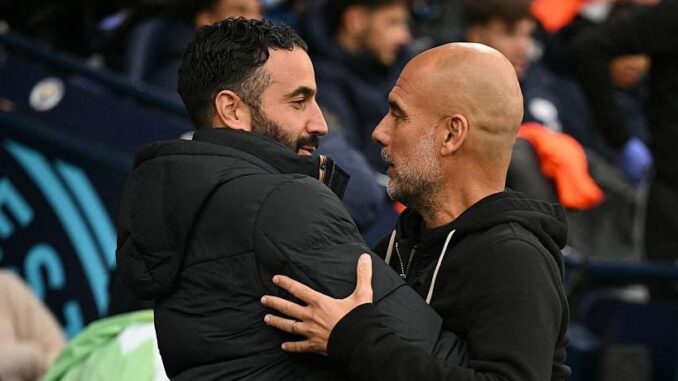
In a compelling tactical display that saw Manchester City secure a 3-0 victory, the latest Manchester derby was a study in strategic dominance and individual brilliance. The win at the Etihad Stadium was a much-needed response from Pep Guardiola’s side following back-to-back Premier League defeats, while for Manchester United, the result underscored ongoing struggles and tactical vulnerabilities.
City’s Midfield Masterclass and Relentless Overload
From the outset, City’s game plan was clear: exploit the gaps in United’s two-man central midfield. United, under Ruben Amorim, lined up in their characteristic 5-2-3 defensive formation, a system that has historically given City problems. However, Guardiola’s team countered this by strategically placing extra bodies in the spaces between United’s lines. The movement of players like Phil Foden and Tijjani Reijnders was crucial, as they operated on either side of United’s central pivot, a duo that included Bruno Fernandes. This created a numerical overload that United’s defense struggled to manage.
A key moment in the match and the genesis of City’s opening goal came from this tactical approach. United’s central defenders, particularly Leny Yoro, are tasked with stepping up to press City’s advanced midfielders. On this occasion, a moment of indecision from Yoro proved fatal. He “inexplicably hesitated, then dropped,” as one analyst noted, creating the precise space Foden needed to exploit. The ball was worked wide, and Jérémy Doku’s cross found Foden, who expertly headed it home for the opener.
Foden’s performance was a highlight, marking his first start of the season with a decisive goal and an overall influential display. “Phil playing behind the striker is so dangerous,” said Guardiola, praising the homegrown talent’s impact. Doku was equally brilliant, with his direct runs and incisive passes consistently troubling the United backline.
The Haaland Factor and United’s Defensive Errors
While City’s collective tactical superiority was the foundation of their win, the clinical finishing of Erling Haaland was the undeniable difference-maker. The Norwegian striker’s two second-half goals were a stark reminder of his ruthless efficiency, bringing his home goal tally to an astonishing 50 in 50 Premier League appearances at the Etihad.
Haaland’s second goal, which effectively sealed the win, was a perfect example of City’s ability to capitalize on United’s transitional vulnerabilities. United’s defensive shape, which can transform into a compact 5-4-1, struggled to cope with City’s speed on the counter. “The biggest difference was when we had transitions,” said Ruben Amorim. “They did better in transition and we suffered in that moment.” This was particularly evident on Haaland’s first goal, a “delicious” move that saw him clip the ball over United’s goalkeeper, Altay Bayindir, after an audacious nutmeg from Nico O’Reilly and slick passes from Foden and Doku had carved the defense open.
United’s struggles were not only tactical but also a result of individual errors. A loose pass from Harry Maguire led directly to Haaland’s third goal, with the striker racing clear and slotting the ball home. These “avoidable” moments, as Amorim described them, compounded United’s problems and highlighted the chasm in quality and composure between the two sides.
A New Goalkeeper and Glimmers of Hope
Manchester City’s debutant goalkeeper, Gianluigi Donnarumma, also played a pivotal role. While the 3-0 scoreline suggests a one-sided affair, United did have their moments. A fierce volley from Bryan Mbeumo, a player who has started the season in impressive form, was destined for the back of the net until Donnarumma pulled off a fine save. This moment was crucial, as a goal for United would have made it 2-1 and potentially changed the entire complexion of the game. Foden himself, in a show of respect, suggested he might give his Man of the Match award to the Italian stopper, calling him “unbelievable” for his contribution.
For United, despite the disappointing result, there were some bright spots. Bryan Mbeumo’s attacking prowess was on full display, and his pace and directness caused City problems. Bruno Fernandes, deployed in a deeper midfield role, offered some creative impetus, even if he struggled to contain City’s central overloads. After the match, Fernandes was honest about his team’s tactical failings. He explained that the plan was for the midfielders to “jump on Rodri” and for the defenders to press Foden. However, a “miscommunication” led to too much space being conceded, which City capitalized on. He added, “If you are not brave enough to do that it is very difficult.”
The derby was a clear statement from Manchester City, demonstrating their return to form and sending a message to the rest of the league. For Manchester United, it was a painful lesson in their ongoing rebuild and the need to address fundamental tactical flaws.
Leave a Reply